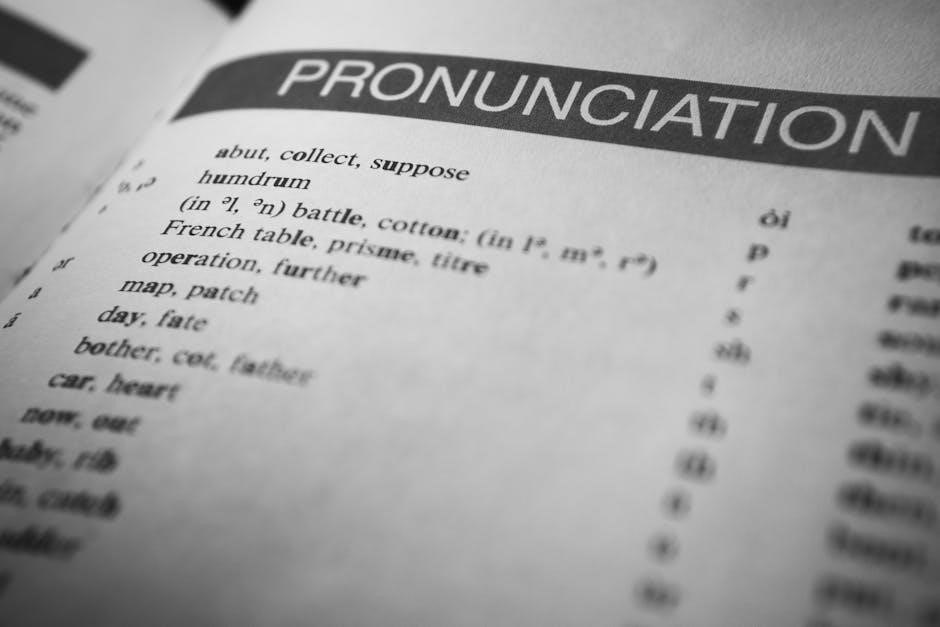Act 2: Overview
Act 2 of Romeo and Juliet shifts focus to the blossoming romance between the titular characters. Despite their families’ feud‚ their love deepens‚ leading to secret vows and plans for marriage‚ marking a pivotal turn.

Act 2 Scene 1: Summary and Analysis
Romeo‚ avoiding his friends‚ leaps over the Capulet’s orchard wall‚ drawn by Juliet. Mercutio and Benvolio search for him‚ unaware of Romeo’s new love‚ assuming he still pines for Rosaline‚ using wit to mock him.
Romeo’s Hiding and Mercutio’s Mocking
Following the Capulet feast‚ Romeo‚ captivated by Juliet’s beauty‚ separates himself from Benvolio and Mercutio. He hides within the Capulet’s orchard‚ driven by his overwhelming affection. Mercutio‚ ever the witty and cynical friend‚ attempts to draw Romeo out of hiding. He employs humorous‚ and at times bawdy‚ language‚ invoking Rosaline’s name‚ unaware that Romeo’s affections have shifted dramatically.
Mercutio’s mocking serves as a contrast to Romeo’s intense and sincere emotions. Benvolio‚ more pragmatic‚ urges Mercutio to abandon the search‚ recognizing its futility. Their lighthearted banter highlights the difference between their understanding of love and Romeo’s passionate experience. This scene establishes Romeo’s profound change and the others’ ignorance of it.
Situational Irony: Romeo’s True Feelings
The scene is thick with situational irony as Mercutio and Benvolio believe Romeo is still pining for Rosaline. They try to conjure him by jesting about her physical attributes‚ completely oblivious to the fact that Romeo has moved on. Their words‚ intended to tease Romeo about his unrequited love‚ are ironically misplaced. The audience‚ however‚ is aware of Romeo’s newfound love for Juliet‚ creating a dramatic gap between the characters’ understanding and the reality of the situation.
This irony emphasizes the swiftness and intensity of Romeo’s change of heart. It also foreshadows the larger conflicts in the play‚ where miscommunication and misunderstanding lead to tragic consequences. The audience’s awareness of Romeo’s true feelings heightens the dramatic tension‚ making Mercutio’s and Benvolio’s lighthearted banter seem almost painful in its ignorance.

Act 2 Scene 2: The Balcony Scene
The iconic balcony scene unveils Romeo and Juliet’s profound connection as they exchange heartfelt declarations of love‚ transcending family animosity and societal expectations amidst the moonlit night.
Romeo’s Soliloquy: Juliet as the Sun
Romeo’s famous soliloquy in Act 2 Scene 2 marks a pivotal moment‚ elevating Juliet to an almost celestial status. He uses potent light imagery‚ casting Juliet as the sun‚ a source of warmth and life‚ eclipsing the “envious moon‚” representing Rosaline. This symbolizes the shift in Romeo’s affections‚ replacing past infatuation with a profound and genuine love.
He urges Juliet to cast off her “vestal livery‚” signifying a rejection of chastity and a full embrace of their love. The soliloquy reveals Romeo’s infatuation and highlights the transformative power of love. Juliet’s beauty is not just physical; it is a radiant force that inspires Romeo to shed his former self and embrace a new identity defined by their connection.
The sun metaphor foreshadows Juliet’s ultimate role as the center of Romeo’s world‚ a light that guides and sustains him. This passionate declaration sets the stage for their clandestine romance‚ driven by an intensity that defies familial conflict.
Juliet’s Soliloquy: The Importance of Names
Juliet’s soliloquy delves into the superficiality of names‚ questioning their significance in defining a person’s essence. She wonders why Romeo’s name‚ a mere label‚ should be an obstacle to their love. “What’s in a name?” she asks‚ suggesting that a rose would smell just as sweet regardless of its designation.
Juliet argues that Romeo’s inherent qualities‚ his beauty‚ virtue‚ and love‚ are independent of his Montague identity. She wishes he would renounce his name or‚ if not‚ she would forsake her own. This highlights the arbitrary nature of the feud and the tragic consequences of allowing family names to dictate destinies.
Her contemplation emphasizes the conflict between individual desire and societal constraints. Juliet’s longing for Romeo transcends the boundaries imposed by their families‚ revealing a profound desire for genuine connection over inherited animosity; She yearns for a world where love is not dictated by superficial labels.
The Exchange of Vows
In the heart of the balcony scene‚ Romeo and Juliet‚ emboldened by their newfound affection‚ exchange vows of love and commitment. Juliet‚ initially hesitant‚ expresses concern about the hasty nature of their bond‚ fearing it may be too rash and fleeting. She seeks reassurance of Romeo’s genuine intentions.
Romeo‚ unwavering in his devotion‚ passionately declares his love‚ swearing upon the moon. Juliet‚ however‚ interrupts‚ cautioning against oaths sworn on such an inconstant object. Instead‚ they pledge their love to each other directly‚ promising unwavering fidelity and affection.
Their exchange solidifies their decision to pursue a life together‚ despite the obstacles they face. They resolve to marry in secret‚ seeking Friar Lawrence’s assistance to unite them. The vows mark a turning point‚ binding them together in a destiny fraught with both passion and peril‚ setting the stage for the ensuing tragic events.

Act 2 Scene 3: Romeo and Friar Lawrence
Romeo seeks Friar Lawrence’s help after the balcony scene. He asks the Friar to marry him and Juliet‚ hoping to end the family feud through their union.
Romeo’s Request and Friar Lawrence’s Hesitation
In Act 2 Scene 3‚ Romeo approaches Friar Lawrence with a surprising request: he asks the Friar to marry him and Juliet. Romeo’s sudden shift from Rosaline to Juliet raises concerns for Friar Lawrence. He questions the depth and maturity of Romeo’s feelings‚ suggesting his love might be based on infatuation rather than genuine affection.
The Friar is taken aback by the speed at which Romeo has moved on. He reminds Romeo of his previous‚ dramatic declarations for Rosaline‚ implying that Romeo’s emotions are fickle and unreliable. Despite his reservations‚ the Friar ultimately considers Romeo’s plea. He sees a potential opportunity to end the long-standing feud between the Montagues and Capulets.
Friar Lawrence’s Motivation: Hope for Peace
Friar Lawrence‚ though initially hesitant about Romeo’s impulsive request to marry Juliet‚ ultimately agrees‚ driven by a higher purpose. He sees in their union a chance to quell the animosity that has plagued Verona for so long. The Friar believes that the marriage between a Montague and a Capulet could serve as a catalyst for reconciliation‚ bridging the gap between the warring families.
He hopes that the love shared by Romeo and Juliet will be powerful enough to transcend the hatred that divides their households. Friar Lawrence’s decision is therefore not merely based on romantic ideals‚ but on a calculated risk to achieve lasting peace within the community. He is willing to gamble on the young lovers’ passion‚ hoping it will blossom into a resolution for the feud.

Act 2 Scene 4: Benvolio‚ Mercutio‚ and Romeo
This scene showcases the witty banter between Benvolio‚ Mercutio‚ and Romeo. It highlights Romeo’s transformation due to love and sets the stage for the Nurse’s arrival with Juliet’s message.
Mercutio’s Humor and Romeo’s Change
Mercutio dominates this part of Act 2 Scene 4 with his characteristic wit and playful mockery. He continues to jest about Romeo’s past infatuation with Rosaline‚ unaware of Romeo’s new love. Mercutio’s humor is often bawdy and cynical‚ a stark contrast to Romeo’s increasingly romantic and sentimental nature.
Romeo‚ however‚ is noticeably changed. He engages in the banter but his heart is clearly elsewhere‚ preoccupied with thoughts of Juliet. His responses are sharper‚ wittier‚ and he seems more lighthearted than he was before meeting Juliet. This newfound joy and quickness of mind are directly attributed to his love for Juliet.
The scene highlights the contrast between Mercutio’s cynical view of love and Romeo’s idealistic passion. Romeo’s transformation is evident‚ showcasing the profound impact Juliet has had on him‚ shifting him from melancholy to a more vibrant and engaged state. This sets the stage for the Nurse’s arrival.
The Nurse’s Arrival and Message from Juliet
The arrival of the Nurse in Act 2 Scene 4 marks a shift in tone and pace. She enters the scene‚ a stark contrast to the witty banter of Romeo and Mercutio. Her presence immediately signals a connection to Juliet and the world of the Capulets. Mercutio‚ ever the joker‚ mocks her appearance and demeanor.
Romeo‚ however‚ treats her with respect‚ understanding her role as Juliet’s confidante. The Nurse delivers Juliet’s message to Romeo‚ which includes instructions about their planned marriage. She questions Romeo’s intentions‚ seeking reassurance that he is sincere in his love for Juliet.
Romeo assures her of his honorable intentions and provides details about the secret marriage arrangements. He instructs the Nurse to have Juliet meet him at Friar Lawrence’s cell that afternoon. The Nurse‚ acting as a messenger and a cautious guardian‚ exits to deliver Romeo’s response to Juliet‚ further advancing the plot.
Act 2 Scenes 5 & 6: Juliet‚ the Nurse‚ and the Marriage
These scenes focus on Juliet’s anxious anticipation‚ the Nurse’s delayed return with news‚ and the secret marriage of Romeo and Juliet‚ highlighting themes of love‚ impatience‚ and youthful impulsivity.
Juliet’s Impatience and the Nurse’s Delay
Juliet’s youthful eagerness and romantic longing are starkly contrasted with the Nurse’s drawn-out return. This creates dramatic tension. The Nurse’s delay amplifies Juliet’s anxiety. Juliet‚ consumed by her love for Romeo‚ waits impatiently for the Nurse to return with news of the marriage arrangements. This highlights the generational differences between them‚ as the Nurse seems to relish teasing Juliet.
Juliet’s pent-up emotions and passionate nature clash with the Nurse’s more prosaic and leisurely approach. The Nurse’s dawdling is not malicious but rather characteristic. This contrast underscores the intensity of Juliet’s love and her desperate desire to unite with Romeo‚ emphasizing the themes of youthful passion and the obstacles it faces. The delay heightens the audience’s anticipation.
The Marriage Ceremony and Friar Lawrence’s Warning
Act 2 culminates in the secret marriage of Romeo and Juliet‚ officiated by Friar Lawrence. This event marks a pivotal point. The marriage transforms their individual desires into a shared destiny. Friar Lawrence‚ despite his initial hesitation‚ agrees to marry them. He hopes the union will end the feud between the Montagues and Capulets;
However‚ even amidst the joy‚ Friar Lawrence delivers a somber warning‚ foreshadowing the tragic events to come. He cautions them to love moderately‚ recognizing the dangers of excessive passion. “These violent delights have violent ends‚” he says. This serves as dramatic irony‚ as their intense love ultimately leads to their demise. His warning highlights themes of fate and the destructive nature of unchecked emotions.
